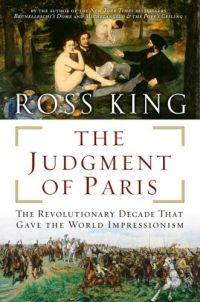

Purchase
The Judgement of Paris
Ross King
The Revolutionary Decade that Gave the World Impressionism
Walker & Company
January 2006
384 pages
ISBN: 0802714668
Hardcover
Add to Wish List
Historical
From the acclaimed author of the bestsellers Brunelleschi’s
Dome and Michelangelo & the Pope’s Ceiling. While the Civil War raged in America, another very different
revolution was beginning to take shape across the Atlantic,
in the studios of Paris: The artists who would make
Impressionism the most popular art form in history were
showing their first paintings amidst scorn and derision from
the French artistic establishment. Indeed, no artistic
movement has ever been, at its inception, quite so
controversial. The drama of its birth, played out on canvas,
would at times resemble a battlefield; and, as Ross King
reveals, it would reorder both history and culture, and
resonate around the world. The Judgment of Paris chronicles the dramatic decade between
two famous exhibitions: the scandalous Salon des Refusés in
1863, and the first Impressionist showing in 1874, set
against the rise and dramatic fall of Napoleon III and the
Second Empire, after the Franco-Prussian War. A tale of many
artists, it revolves around the lives of two, described as
“the two poles of art”—Ernest Meissonier, the most famous
and successful painter of the 19th century, hailed for his
precision and devotion to history; and Edouard Manet,
reviled in his time, who nonetheless heralded the most
radical change in the history of art since the Renaissance.
Out of the fascinating story of their parallel lives,
illuminated by their legendary supporters and critics—Zola,
Delacroix, Courbet, Baudelaire, Whistler, Monet, Hugo,
Degas, and many more—Ross King shows that their contest was
not just about Art, it was about how to see the world. With
a novelist’s skill and the perception of an historian, King
recalls a seminal period when artistic expression had the
power to electrify and divide a nation.
Comments
No comments posted.
Registered users may leave comments.
Log in or register now!
| 


 © 2003-2025 off-the-edge.net
all rights reserved Privacy Policy
© 2003-2025 off-the-edge.net
all rights reserved Privacy Policy